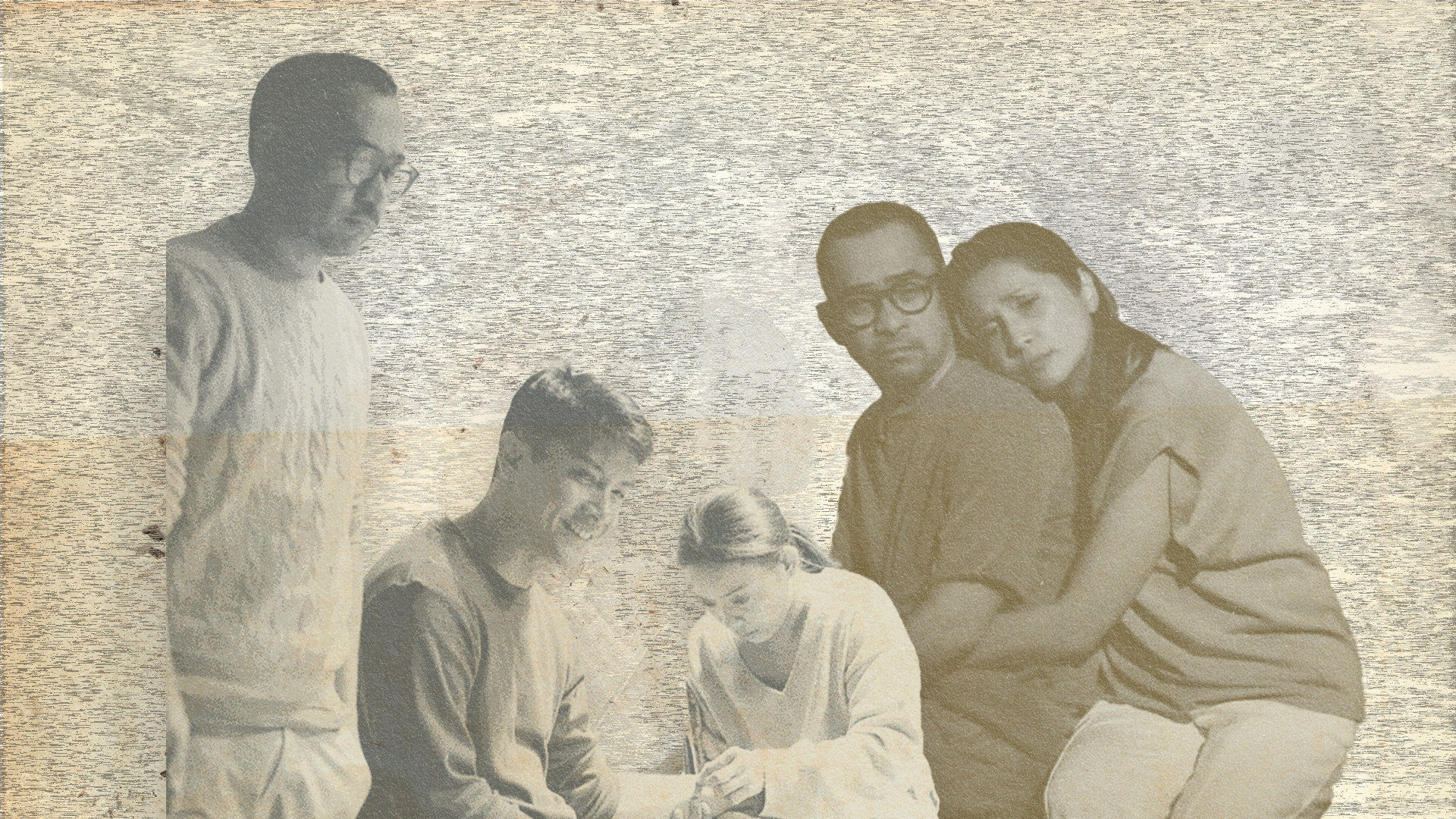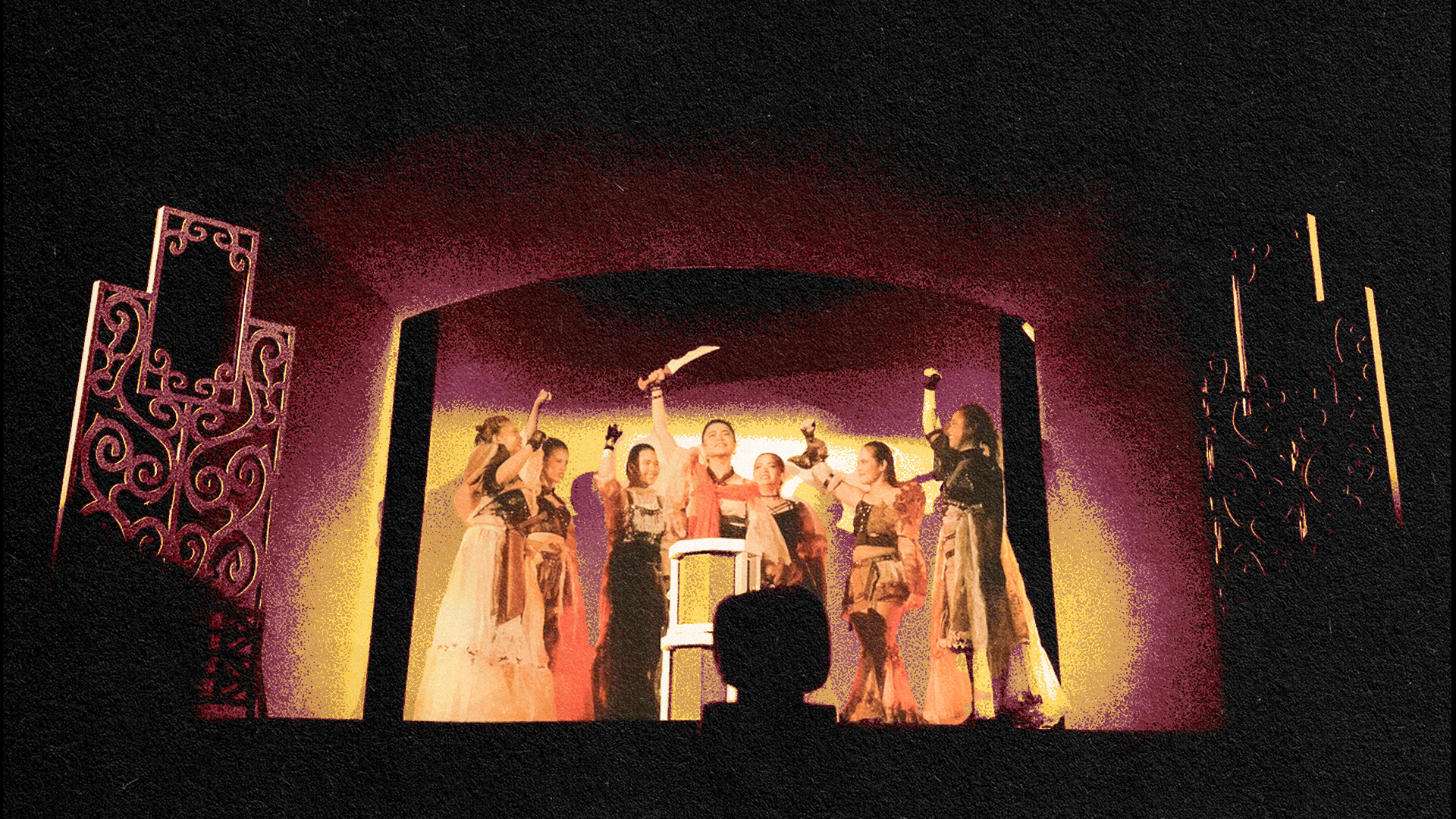On time and grief: Scene Change’s ‘3 Upuan’ and ‘Dagitab’
On time and grief: Scene Change’s ‘3 Upuan’ and ‘Dagitab’
Feature art by Abigail Manaluz
Grief comes in many forms. It can knock at your door all of a sudden and greet you like an old friend. It may come in like a whiplash and sorely hit you in the face. It comes with loss and when it comes, it’s an all consuming force ready to break you open. To some, it stays hidden, only manifesting itself in your daily routine or hobbies. It can break relationships if not addressed. Hell, it can even lead you to self-destruction if it is not properly dealt with.
The double whammy of pain is grief and time. Time is an immovable concept in which it governs us. They always say time heals wounds, but it doesn’t happen frequently. Time is a cruel friend that holds your destiny in a tight leash. Days can feel like forever and months can pass by swiftly before your eyes. Time hides memories and reveals it at the most random instances. Happy memories can feel like ages ago, and a traumatic one feels like yesterday. Grief shifts time, at least its linear order of it, for it takes you back and forth to the past and future, leaves you wondering what had been and what could’ve been.
We have attempted to make sense of grief for so long. There are numerous works of art surrounded by the topic of grief in hopes we can come to terms with it. What we learn is grief and the passage of time while dealing with grief are different to everyone. In the two recent plays from Scene Change, 3 Upuan and Dagitab, these two forces are the primal focuses. Both plays, written by Guelan Varela-Luarca, handled the themes in different ways and were done with care and knowledge about the themes.
‘Death ruined time for me’: 3 Upuan
From the first words uttered in the play, you knew you’re in for a devastating ride. Jai opens the play with a monologue about her thoughts and feelings that ultimately introduce the themes of the play: grief and time.
You can sense when time shifted in the play. At first, the most mundane moments that happen during hospital visits are presented. Scenes are cut abruptly to move on to another moment from the hospital visit. The play then slowly presents the moral arguments that occurred and slowly reveals their characters and the most crucial moments during the final days of their father’s death. There’s still some sense of linear passage of time, but scenes are more deliberate in showing the complicated relationship of the siblings and the distance between them. The play would sometimes go and forth to the past but only to exhibit the tightness of their relationship before as opposed to the present where they feel distant after Jai went away to New York and worked as a journalist.
Each sibling experienced their grief in different ways. The gradual loss of their close camaraderie as years passed by affected their own way of dealing with loss. All of them are silent with their approach, but in those moments of silent lies, you can see the cracks forming and ruining the strong facade they are trying to put up in front of people.
One of the most heartbreaking displays comes from Jack. Jack has been riddled with problems even before the show starts. From his debt to Jers, to the very fact that he hasn’t picked up a pen for five years, life has been very hard for him. After the death of his father, he frequented their parents’ grave and just talked to them about life. The culminating point of his arc is when his emotions finally burst during a car ride with Jai, her sister. The emotions are running high and Jack is in his frenzied state that shook Jai to her core.
Jai experienced grief the hardest. As opposed to Jack, Jai has been thriving in her work as a journalist. Yet, during the setting of the play, life hit her the hardest. After just mourning the loss of her dad and the betrayal of her partner, time took away something from her: Jack. Years jump as she and Jers prepare an exhibit to remember him by.
In between scenes, we are transported to a classroom where Jers, the oldest of the siblings and a university professor, teaches philosophy to his students. It happens several times during the play as if he is unknowingly philosophizing and intellectualizing his approach to grief to mask any semblance of vulnerability forming in his facade. The cracks are there but they only surface rarely and thankfully, during the times when he’s around his siblings and his loved ones. When death finally caught up to him, he accepted it peacefully.
“Death ruined time for me,” Jai’s world changed. She visits memories to ruminate on life and the what-have-been’s. Time bended and shifted, the metaphysical time travel sequence is a profound sight to see. The presentation of Jai’s eventual life after loss is fascinating. You witness how Jai evolves as the world shifts around her. Jai turned grief into something meaningful and let time heal her wounds. She knows it is only a matter of time that she will soon meet death and finally she will be once more with her family.
‘Chronology is overrated’: Dagitab
Grief manifested in poetry and mystery. Unlike 3 Upuan, Dagitab’s stage adaptation is much more elaborate on tackling how grief consumes a person, especially through the arc of Jimmy. The memory is never neglected as Jimmy pursues his academic ambition in disguise of searching for his former lover back in college, who is believed to have passed away years ago. Others have warned him not to pursue this anymore but Jimmy, ever the courageous, did not heed their concerns.
His wife, Issey, laments their fractured marriage in the form of literary language, as how the dialogues in the play were written. There’s an apparent, physical distance between them, which differs from the movie, where you can obviously see two professors comfortable with each other. In the original movie, the cracks of their relationship is seen through silence and at times they are not together. In the play, however, there is an obvious rift in between them and at the end, after everything that has happened, they still find each other and choose each other. Grief comes to her in the form of self-destruction, where the decisions she made ruined her.
Scenes are not presented in linear style, another key aspect that differs the film from the stage adaptation. At first, it would jump ahead, showing us how Jimmy had spent a long while in the mountains pursuing his research. Several times, they overlap, deepening the meaning and impact of them. At one point, Issey speaks to the crowd, her little yellow putas, while Jimmy pursues the spirit of Lorena, who Jimmy believes to be the goddess he was looking for. Even the opening scene, where Angelo read Gab’s work and warned him about the dangers of publishing it, hence showing the audience what Gab would turn into with his desire to write blinds his morality. This arc was not visited again until the second act, in which Issey faced the social repercussions of what happened between them and Gab.
How Valera-Luarca played with time here feels more experimental. The intention and purpose is pure, but with some experiments: sometimes it works, sometimes it doesn’t. While he succeeded in 3 Upuan with its time-bending exploration of grief, Dagitab’s chronology-is-overrated approach is a bit messy. There is no definite answer whether Dagitab succeeded or failed with its approach, for it really worked at times. For a dialogue-heavy play, it was a bit hard to catch on with some overlapping scenes for your focus is divided. It was even more challenging to watch a dialogue passing more in the verbose territory than in a profound one. It is understandable, given how the characters are all writers—youngbloods and experienced—but I will have to circle back to its execution that it was, at times, messy to watch.
Overall, the approach of the two plays differ, the first excellently tackles and blends the two themes seamlessly, while the second one has an interesting take on its themes but its take on time has a room for improvement. But one thing is certain, Scene Change’s productions are one to watch in the future for they offer rich narratives about the human experience and the messiness of it all.




















